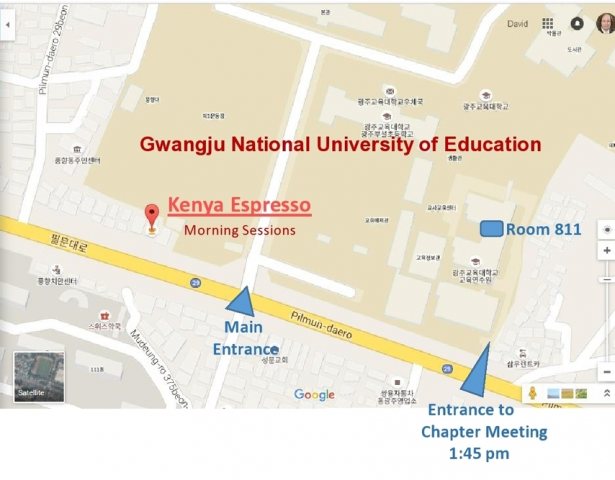
___________________________________
Gwangju-Jeonnam Chapter May Meeting
.
––– Morning Korean Help Cafe –––
Time: 10:00 - 10:50 am (Sat., May 21). After-10 arrivals are welcome.
Location: Kenya Espresso Cafe (directions below and map at bottom)
Bring your questions about the Korean language.
Target group: High-Beginner to Low-Intermediate.
David Shaffer at the Help Table. Casual format.
––– Morning Reflective Practice Session –––
Topic: Dealing with Social Issues in the EFL Classroom: Discussing the Issues
Session Facilitator: Justin Ancheta
Time: 11:00 am - 12:30 pm (Sat., May 21)
![]() Location: Kenya Espresso Cafe near GNUE. Ground floor of 광주우리교회 Building.
Location: Kenya Espresso Cafe near GNUE. Ground floor of 광주우리교회 Building.
––– Main Meeting Schedule –––
Time: Saturday, May 21, 2016, 1:45 - 5:00 pm
Location: Gwangju National University of Education (GNUE), Teacher Training Center (교사교육센터) 1st Floor; Room 811. Detailed directions HERE.
1:45 pm: Sign-in and Meet-and-Greet (Admission is free. Future membership is welcomed.)
2:00 - 2:50 pm: Presentation 1
Dealing with Social Issues in the EFL Classroom: Discussing Case Studies
Justin Ancheta
2:50 - 3:10 pm: Refreshment Break
3:10 - 4:00 pm: Presentation 2
Fluency Activities for the EFL Classroom
Jessica Ives
4:10 - 5:00 pm: Swap-Shop Presentations
Share your Teaching Ideas, Classroom Activities, and Teaching Wisdom with the group.
(Everyone is encouraged to share. Short tidbits are welcomed. Handouts also welcomed.)
5:00 pm: Announcements / Drawing for Door Prizes / Closing
––– After-meeting dinner at The First Alleyway, downtown –––
Presentation Summaries and Presenter Bio-sketches
Dealing with Social Issues in the EFL Classroom:
Discussing Case Studies
By Justin Ancheta
In a world that is increasingly interconnected and globalized, social issues – issues concerning topics of socio-economic status, gender, race, and disabilities – are becoming increasingly important in education. EFL educators, in their pursuit of delivering impactful and meaningful English learning experiences, may easily overlook these issues and how they can impact both student and teacher. Both teachers and students are in positions of incredible influence, in terms of shaping how each side sees each other, themselves, and the world around them. Without full awareness or understanding of the issues and the people involved, educators and students alike have the potential to inadvertently (through no fault of their own) perpetuate prejudice and negative attitudes with respect to social issues. This can have serious and immediate consequences in classrooms with students who have physical or developmental disabilities, who are of mixed-ethnic descent, or who do not conform to traditional societal gender norms. This can also have serious and immediate consequences for EFL educators who come from diverse ethnic backgrounds, or who have physical disabilities themselves. Needless to say, educators are not to blame, but there is arguably a need for more awareness and understanding of these issues.
As teachers, we are an integral part of the solution to issues such as sexism, racism, and ableism, among others. However, being part of the solution requires a willingness to engage in dialogue on challenging topics, a recognition of our own biases, and a desire to celebrate the diversity seen both in our classrooms, and in the world at large, that our students will inherit. It means having challenging conversations with each other about sensitive topics that may lead to a reexamination of how we see ourselves and our students in our classrooms. Arguably, engagement in these challenging conversations can help Korean EFL educators to better understand both their students and their communities. It can help to better inform their approach to teaching and their teaching practice, to promote positive attitudes towards social issues. Such attitudes will be increasingly important in the future, as our globalized society becomes more and more diverse and interconnected.
The aim of this two-part presentation is to help open the door to Korean EFL educators’ awareness of social issues, to promote positive and constructive dialogue on the impact of these issues in our classrooms, and to present practical, easily implementable ways to address these issues going forward. The first part, during the Reflective Practice SIG session in the morning, aims to encourage basic discussion of social issues and their relevance towards our professional practice as Korean EFL educators. The second part, during the main meeting in the afternoon, will present attendees with a variety of case studies involving social issues. Discussion of these case studies will not only help raise awareness of the issues involved, but also constructively generate solutions to help educators when they face similar situations in their classrooms. Finally, I intend to present some practical suggestions for addressing social issues, drawn from prior experience teaching middle school. By the end of this presentation, I hope to at least raise awareness of social issues in the classroom and how we can address these issues to help our students develop into better global citizens. The two parts of this presentation are independent of each other.
The Presenter
 Justin Ancheta is currently an elementary EFL teacher with the Jeollanamdo Language Program (JLP). He has had prior experience teaching middle school with the JLP, in addition to elementary school in Daegu under the English Program in Korea (EPIK). He has a Bachelor of Education degree from the University of Toronto’s Ontario Institute for Studies in Education, where he gained experience teaching among inner-city communities affected by poverty and racism. He is highly interested in the use of science and English education to help overcome barriers to opportunity and achievement in education.
Justin Ancheta is currently an elementary EFL teacher with the Jeollanamdo Language Program (JLP). He has had prior experience teaching middle school with the JLP, in addition to elementary school in Daegu under the English Program in Korea (EPIK). He has a Bachelor of Education degree from the University of Toronto’s Ontario Institute for Studies in Education, where he gained experience teaching among inner-city communities affected by poverty and racism. He is highly interested in the use of science and English education to help overcome barriers to opportunity and achievement in education.
____________________
Fluency Activities for the EFL Classroom
By Jessica Ives
In the language learning classroom, fluency is a skill that can sometimes be overlooked. This could be due to the difficulty in creating activities that develop fluency. As explained by Paul Nation (1989), “fluency involves the speed and flow of language production, the degree of control of language items, and the way language and content interact” (p. 377). In order to facilitate the development of fluency, activities in which the learner's focus is shifted away from language forms and onto the message that is being communicated can be incorporated into the classroom. Therefore, the overall purpose of fluency-building activities is to allow the learner to negotiate with previously learned language “chunks.” These chunks are then made more easily accessible because the activity focuses on communicating the message.
One activity that can help in fluency building is the 4/3/2 technique. For this technique, as Nation (1989) describes, the learner talks on the same topic three times; however, each consecutive time is constrained by a decreased time limit. In this presentation/workshop, the presenter will further explain the 4/3/2 technique; in addition, the benefits for learners will also be outlined. Next, the presenter will demonstrate one way this technique can be used in the classroom. After that, the presenter will also provide additional activities that help develop fluency. For the last segment, participants will brainstorm various ways that the technique and activities can be incorporated into their teaching contexts. By the end of the presentation, I hope teachers will be more aware of the benefits of developing fluency and take with them some new fluency-building activities to use in their classroom.
(This will be an extended version of a workshop presented in April 2016 at the Gwangju-Jeonnam KOTESOL Mokpo–Muan Outreach Special Workshops.)
Reference
Nation, I.S.P. (1989). Improving speaking fluency. System, 17(3), 377–384.
The Presenter
 Jessica Ives is from Niagara Falls, Canada. This is her second year teaching as a professor at Dongshin University in Naju. Before teaching in Korea, she was an ESL Instructor at Brock University in St. Catharines, Ontario, Canada. She completed both her Bachelor of Arts (Honours) and Master of Arts in Applied Linguistics (TESL) at Brock University. She is interested in Reflective Practice and the sociolinguistic aspects of language teaching.
Jessica Ives is from Niagara Falls, Canada. This is her second year teaching as a professor at Dongshin University in Naju. Before teaching in Korea, she was an ESL Instructor at Brock University in St. Catharines, Ontario, Canada. She completed both her Bachelor of Arts (Honours) and Master of Arts in Applied Linguistics (TESL) at Brock University. She is interested in Reflective Practice and the sociolinguistic aspects of language teaching.



